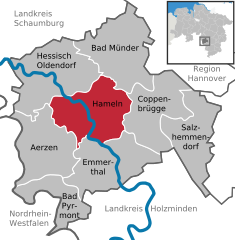Hameln
|
Hamelin Hameln |
||
|---|---|---|

Panorama of Hamelin
|
||
|
||
| Coordinates: 52°6′N 9°22′E / 52.100°N 9.367°ECoordinates: 52°6′N 9°22′E / 52.100°N 9.367°E | ||
| Country | Germany | |
| State | Lower Saxony | |
| District | Hamelin-Pyrmont | |
| Government | ||
| • Lord Mayor | Claudio Griese (CDU) | |
| Area | ||
| • Total | 102.30 km2 (39.50 sq mi) | |
| Population (2015-12-31) | ||
| • Total | 56,529 | |
| • Density | 550/km2 (1,400/sq mi) | |
| Time zone | CET/CEST (UTC+1/+2) | |
| Postal codes | 31785–89, 3250 | |
| Dialling codes | 05151 | |
| Vehicle registration | HM | |
| Website | www.hameln.de | |
Hamelin (/ˈhæməlᵻn/ or /ˈhæmlᵻn/; German: Hameln) is a town on the river Weser in Lower Saxony, Germany. It is the capital of the district of Hamelin-Pyrmont and has a population of roughly 56,000. Hamelin is best known for the tale of the Pied Piper of Hamelin.
Hamelin started with a monastery, which was founded as early as 851 AD. A village grew in the neighbourhood and had become a town by the 12th century. The incident with the "Pied Piper" (see below) is said to have happened in 1284 and may be based on a true event, although somewhat different from the tale. In the 15th and 16th centuries Hamelin was a minor member of the Hanseatic League.
In June 1634, during the Thirty Years' War, Lothar Dietrich, Freiherr of Bönninghausen, a General with the Imperial Army, lost the Battle of Oldendorf to the Swedish General Kniphausen, after Hamelin had been besieged by the Swedish army.
The era of the town's greatest prosperity began in 1664, when Hamelin became a fortified border town of the Principality of Calenberg. In 1705, it became part of the newly created Electorate of Brunswick-Lüneburg, also called Hanover, when George Louis, Prince of Calenberg, later King George I of Great Britain, inherited the Principality of Lüneburg.
...
Wikipedia



